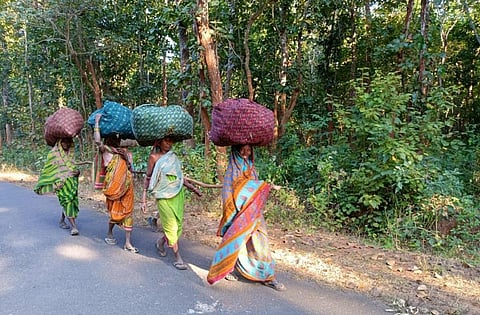

Snehalata Masanta, a tribal woman from Badamgada village in Odisha’s Sambalpur district, spends most of her summer days collecting minor forest produce (MFP) like leaves of kendu and siali, sal seeds, mahua flowers and tamarind.
She sets out to the nearby forests in the morning and returns after sunset every day in summer, starting from March to June. But she found it difficult to deal with the searing heat this summer, particularly in the last two months. Unusually high temperatures have robbed her of her livelihood.
“We could not spend much time in the jungle to collect the forest produce due to the scorching heat. We return from the jungle before 10 am,” she said. Last year, she could collect around 8-10 quintals of sal seeds. This year, she has collected only one-and-a-half quintals so far.
The sweltering June heat that has been gripping Odisha in June, with temperatures hovering over 40-45°C, hit Sneha and thousands of tribal women who depend on MFP to eke out a living hard.
“We collect siali leaves for making plates. The quality of leaves, however, was not good due to the lack of pre-monsoon rains. These leaves cannot be used to make plates,” said Ipsita Behera of Kalamba in Nayagarh district.
Similarly, high humidity has affected the quality of kendu leaves. “Due to heat, we could not collect as much kendu leaf this time compared to the previous year,” said Reeta Jani, one of the kendu leaf pluckers of Simanbadi village in Kandhamal district.
The divisional forest office in Kandhamal district has also admitted a decrease in the procurement of Kendu leaves this year. The procurement of kendu leaves kerry (a bundle of 100 leaves) here dwindled to 52,580,310 in 2023 from 56,472,055 in 2022, said a government official. The leaves are usually collected from April 15-May 15.
Around 2,500 quintals of sal seeds have been procured in the district so far. This year, the seeds were procured by the Odisha Tribal Development Cooperative Corporation Limited, a state government-owned organisation. The organisation did not procure the sal seeds last year.
Though the heatwave did not claim many lives in the state like Uttar Pradesh and Bihar, the livelihood of the hundreds of tribal people in the state who depend on the MFP have been badly affected, said Y Giri Rao, executive director of Vasundhara, an Odisha-based non-profit working on forest rights.
Around 40 per cent of tribal people in the state eke out their livelihood through the MFP, he said. Scheduled Tribes constitute 22.85 per cent of the state’s total population of 41,974,218, according to the 2021 census.
Poor people, including daily-wage labourers and street vendors, are now bearing the brunt of climate change, said Sudhir Rout, an environmentalist. Many farm labourers and construction workers have been struggling to make both ends meet as the soaring heat prevents them from working, he said.
Uma Shankar Das, a senior scientist of India Meteorological Department’s (IMD), Bhubaneswar centre, said they recorded at least 16 heatwaves in Odisha this summer until June 21, 2023 — the most prolonged spell in the last 12 years.
A heatwave is reported when the temperature is above 40°C with a deviation of 4.5°C from the normal, he said. Earlier, the IMD centre had recorded four-five heatwaves during the summer, he said.